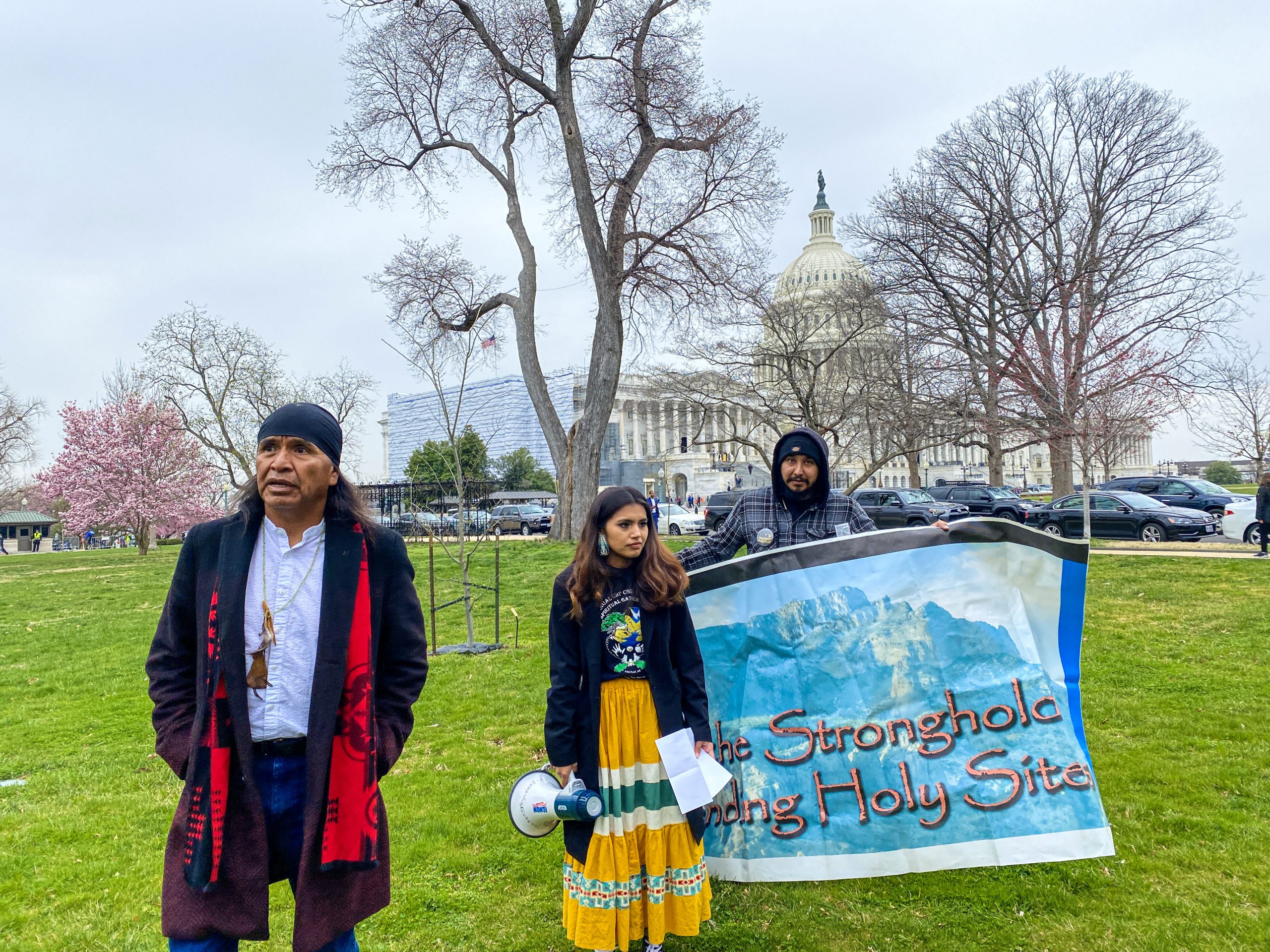Rambler pointed out that the tribe is already suing the United States for issuing the final environmental statement (FEIS) and the draft record of decision for the copper mine mine on January 15. The actions were among the last taken during the Donald Trump administration, when Indian Country’s needs, views and interests were often at the bottom of the list. “As noted in our federal lawsuit, the U.S. Forest Service failed to follow the law in the preparation of a sham final environmental impact statement that was being used to justify trading away our sacred land to further enrich wealthy foreign mining companies,” said Rambler. But on the same day objections were due to the final mine approvals, the tribe’s supporters are also cheering the new development from the nation’s capital. “This fight has never been about just one site — it’s been about ending the cycle of ignoring tribal input whenever it suits polluters,” said Rep. Raúl Grijalva (D-Arizona), the chairman of the House Committee on Natural Resources. “The Trump administration rushed this document out the door as just one more favor to industry, regardless of how legally or scientifically unsupportable it was.”BIG NEWS on #OakFlat.
— indianz.com (@indianz) March 1, 2021
The Biden administration just rescinded federal approval of a huge copper mine on sacred Apache territory in #Arizona.
“This is the right move by the Department of Agriculture," said Chairman Terry Rambler of the San Carlos Apache Tribe. @ProtectOakFlat
Both Rambler and Grijalva, however, noted that the fight is far from over. The foreign backers of Resolution Copper can still pursue federal approval of the cooper mine, a process that was set in place more than six years ago by Congress under a hotly contested provision tucked inside of a 1,648-page bill. “We look forward to continuing our work to permanently protect Oak Flat,” said Chairman Rambler. To that end, Grijalva said he would once again introduce legislation to repeal the controversial law that paved the way for the mine. With Democrats in control of both chambers of Congress and with Democrat Joe Biden in the White House, securing permanent protections of Oak Flat now appears within sight. “The Biden administration is doing the right thing with this reset, and I intend to reintroduce the Save Oak Flat Act in the coming days to make sure this needless controversy is settled on the side of justice once and for all,” said Grijalva. Grijalva has been trying to repeal Section 3003 of the National Defense Authorization Act since it became law in 2014. But Republicans controlled the U.S. House of Representatives for most of the time since then, and the Save Oak Flat Act never even got a hearing. The political landscape began to change in the 116th Congress, when Democrats took over the House. Last March, Grijalva’s committee hosted one of the last in-person hearings of the pre-pandemic era, when elders and citizens of the San Carlos Apache Tribe came to Capitol Hill to protect Oak Flat from the copper mine. “What they are trying to do is to come on Apache territory, our ancestral Apache homeland, and destroy the entire area for a mining corporation,” Naelyn Pike, a young Apache leader, said at a rally at the U.S. Capitol on the day before the hearing.More on #OakFlat:
— indianz.com (@indianz) March 1, 2021
“This fight has never been about just one site – it’s been about ending the cycle of ignoring tribal input whenever it suits polluters,” said Rep. Raúl Grijalva (D-Arizona), Chairman of House Committee on Natural Resources. @ProtectOakFlat @NRDems

At the time, Resolution Copper anticipated the land swap to occur in March. The transfer of federal property to the foreign corporations is currently off the table with the Biden administration’s action on Monday, pending further decisions that the Forest Service said could be “several months” away.We're so pleased to announce that we will be able to maintain public access to areas within Oak Flat, including the campground, upon completion of a federal land exchange. The campground will operate in line with current Tonto National Forest practices. https://t.co/u8opUuMgLI pic.twitter.com/k4Wvyp2IkS
— Resolution Copper (@resolutioncu) February 25, 2021
‘Collateral damage’: Indian education roiled by President Trump’s anti-DEI directives
Secretary Doug Burgum takes over Department of the Interior
Health and Human Services nominee responds to written questions about Indian health
Senate Committee on Indian Affairs schedules first meeting of 119th Congress
Judge hears arguments in federal funding case
NAFOA: 5 Things You Need to Know this Week (February 3, 2025)
Native Hawaiian performer Kalani Peʻa wins fourth Grammy for album dedicated to matriarchs
Department of Defense cancels National Native American Heritage Month
Chuck Hoskin: Cherokee Nation signs first disaster management agreement in Indian Country
DVIDS: Umatilla Tribes sign fish passage agreement
Native America Calling: Balancing economic safety and development for payday loan businesses on tribal land
‘Nothing’s changed. Nothing’s gotten better’: President Trump’s nominee takes on Indian health
Native America Calling: A Mohawk chef on TV and a Native foods cookbook
Cronkite News: Arizona governor promises $7 million for NAGPRA work
More Headlines